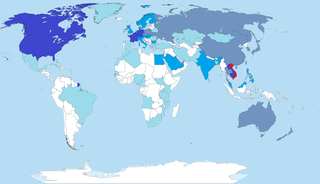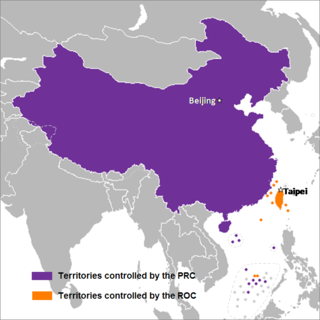Nationality is a legal identification of a person in international law, establishing the person as a subject, a national, of a sovereign state. It affords the state jurisdiction over the person and affords the person the protection of the state against other states.

Overseas Chinese are people of Chinese birth or ethnicity who reside outside the territories of the People's Republic of China (PRC), its special administrative regions (SARs) of Hong Kong and Macau, as well as the Republic of China.
There are various names of Korea in use today, all derived from ancient kingdoms and dynasties. The modern English name "Korea" is an exonym derived from the name Goryeo, also spelled Koryŏ, and is used by both North Korea and South Korea in international contexts. In the Korean language, the two Koreas use different terms to refer to the nominally unified nation: Chosŏn in North Korea and Hanguk in South Korea. Ethnic Koreans living in China and Japan also use the term Chosŏn to refer to Korea.

Chinese people are people or ethnic groups identified with China, usually through ethnicity, nationality, citizenship, or other affiliation.
In international law, a stateless person is someone who is "not considered as a national by any state under the operation of its law". Some stateless people are also refugees. However, not all refugees are stateless, and many people who are stateless have never crossed an international border. On November 12, 2018, the United Nations High Commissioner for Refugees stated there are about 12 million stateless people in the world.

Overseas Vietnamese refers to Vietnamese people who live outside Vietnam. There are approximately 4.5 million overseas Vietnamese, the largest community of whom live in the United States. The oldest wave of overseas Vietnamese left Vietnam as economic and political refugees after the 1975 fall of Saigon and the North Vietnamese takeover of South Vietnam.
Nationality law is the law of a sovereign state, and of each of its jurisdictions, that defines the legal manner in which a national identity is acquired and how it may be lost. In international law, the legal means to acquire nationality and formal membership in a nation are separated from the relationship between a national and the nation, known as citizenship. Some nations domestically use the terms interchangeably, though by the 20th century, nationality had commonly come to mean the status of belonging to a particular nation with no regard to the type of governance which established a relationship between the nation and its people. In law, nationality describes the relationship of a national to the state under international law and citizenship describes the relationship of a citizen within the state under domestic statutes. Different regulatory agencies monitor legal compliance for nationality and citizenship. A person in a country of which he or she is not a national is generally regarded by that country as a foreigner or alien. A person who has no recognised nationality to any jurisdiction is regarded as stateless.

British nationality law as it pertains to Hong Kong has been unusual ever since Hong Kong became a British colony in 1842. From its beginning as a sparsely populated trading port to today's cosmopolitan international financial centre and world city of over seven million people, the territory has attracted refugees, immigrants and expatriates alike searching for a new life.

"Taiwan, China", "Taiwan, Province of China", "Taiwan Province, China" or "Chinese Taiwan" are a set of politically controversial terms that characterize Taiwan and its associated territories as a province or territory of "China".

The Republic of China (Taiwan) passport is the passport issued to nationals of the Republic of China (ROC), commonly known as Taiwan. The ROC passport is also generally referred to as a Taiwan passport.

Chinese nationality law details the conditions in which a person holds People's Republic of China (PRC) nationality. Foreign nationals may naturalize if they are permanent residents in any part of China or they have immediate family members who are Chinese citizens. Residents of the Taiwan Area are also considered Chinese citizens, due to the PRC's extant claim over areas controlled by the Republic of China (ROC).

The population of Taiwan, is approximately 23.57 million, spread across a total land area of about 36,000 km2; it is the seventeenth most densely populated country in the world, with a population density of about 651 inhabitants per square kilometer.
Koreans in Vietnam is a community of Vietnam. It's a population of the Korean expatriates along with some Vietnamese citizens of Korean ancestry. Most of these people (them) are expatriates in Vietnam in 21st century. The population initially came in a military capacity, fighting on both sides of the Vietnam War. After the end of the war, there was little Korean migration or tourism in Vietnam, until the rise of the South Korean economy and the decline of the North resulted in an influx of South Korean investors and North Korean defectors, as well as South Korean men seeking Vietnamese wives. As of 2011, according to statistics of South Korea's Ministry of Foreign Affairs and Trade, they numbered roughly eighty thousand people, making them the second-largest Korean diaspora community in Southeast Asia, after the Korean community in the Philippines and the tenth-largest in the world. A more recent estimate from Vietnam Television says their population might be as large as 130,000. Vietnam and Korea had a connection in the past via survivors of the Ly Dynasty of Vietnam fleeing to Korea via Taiwan. Lý Long Tường/Lee Yong Sang is one such notable figure.

Visitors to the Republic of China (Taiwan) must obtain a visa or authorization in advance, unless they come from one of the visa exempt countries or countries whose nationals are eligible for visa on arrival. All visitors must hold a passport valid for 6 months.
Vietnamese people in Taiwan form one of the island's larger communities of foreign residents. Of the roughly 80,000 Vietnamese workers who resided in Taiwan as of 2006, 60,000 are employed as domestic helpers, 16,000 work in factories, 2,000 in marine-based industries, and the remainder in other lines of work. They compose 21% of the island's foreign workers. 42% work in Taipei City, New Taipei City, and Taoyuan City. Additionally, 118,300 Vietnamese women who met Taiwanese men through international matchmaking services resided in Taiwan as of 2005.

Vietnamese Cambodians refer to ethnic group of Vietnamese living in Cambodia or Vietnamese whom are of full or partial Khmer descent. According to Cambodian sources, in 2013 there are about 15,000 Vietnamese people living in Cambodia. Vietnamese source said there are 156,000 people living in Cambodia, while the actual number could be somewhere between 400,000 and one million people, according to independent scholars. They mostly reside in southeastern parts of Cambodia bordering Vietnam or on boathouses in the Tonlé Sap lake and Mekong rivers. The first Vietnamese came to settle modern-day Cambodia from the early 19th century during the era of the Nguyễn lords and most of the Vietnamese came to Cambodia during the periods of French colonial administration and the People's Republic of Kampuchea administration. During the Khmer Republic and Khmer Rouge governments in the 1970s, the Vietnamese were targets of mass genocides; thousands of Vietnamese were killed and many more sought refuge in Vietnam. Ethnic relations between the Cambodians and Vietnamese are poor and the Vietnamese have been the main target of xenophobic attacks by political parties since the 1990s. Most of the Vietnamese are stateless residents of Cambodia and as a result they face difficulties in getting access to education, employment, and housing.
Vietnamese migrant brides in Taiwan represent marriages between Taiwanese men and Vietnamese brides who are mostly from poor, rural areas of Vietnam, such as those along the Mekong Delta. As of 2006, out of Taiwan’s immigrant population of approximately 428,240 people, 18% were females who had relocated to the country through marriage. Out of this population, about 85% originated from the Southeast Asian countries of Vietnam, Indonesia, Thailand, and Philippines, with the majority hailing from Vietnam. It is estimated that between the years of 1995 and 2003, the number of Vietnamese women married to Taiwanese men increased from 1,476 to more than 60,000 individuals, making the Vietnamese the largest non-Chinese immigrant group living in the island. This event has been seen locally and abroad as something that can potentially evolve into a concerning societal and humanitarian issue. This issue is not just localised in Taiwan but also in Southern China provinces

Taiwan–Vietnam relations are conducted on an unofficial level, as Hanoi adheres to a one-China policy and officially recognises the People's Republic of China only. However, this has not stopped bilateral visits and significant flows of migrants and investment capital between Taiwan and Vietnam. Taiwan has been the fourth largest source of foreign direct investment in Vietnam since 2006. Both countries maintain representative offices; Taiwan is represented by the Taipei Economic and Cultural Office in Hanoi and Ho Chi Minh City, while Vietnam is represented by the Vietnam Economic and Cultural Office in Taipei.
A national without household registration is a person with Republic of China nationality who does not have household registration in Taiwan. Nationals with this status are subject to immigration controls when entering the Taiwan Area, do not have automatic residence rights there, and cannot vote in Taiwanese elections. However, they are exempt from conscription. Most individuals with this status are children born overseas to Taiwanese citizens. About 60,000 NWOHRs currently hold Taiwanese passports with this status.

Relinquishment of United States nationality is the process under federal law by which a U.S. citizen or national voluntarily and intentionally gives up that status and becomes an alien with respect to the United States. Relinquishment is distinct from denaturalization, which in U.S. law refers solely to cancellation of illegally procured naturalization.










